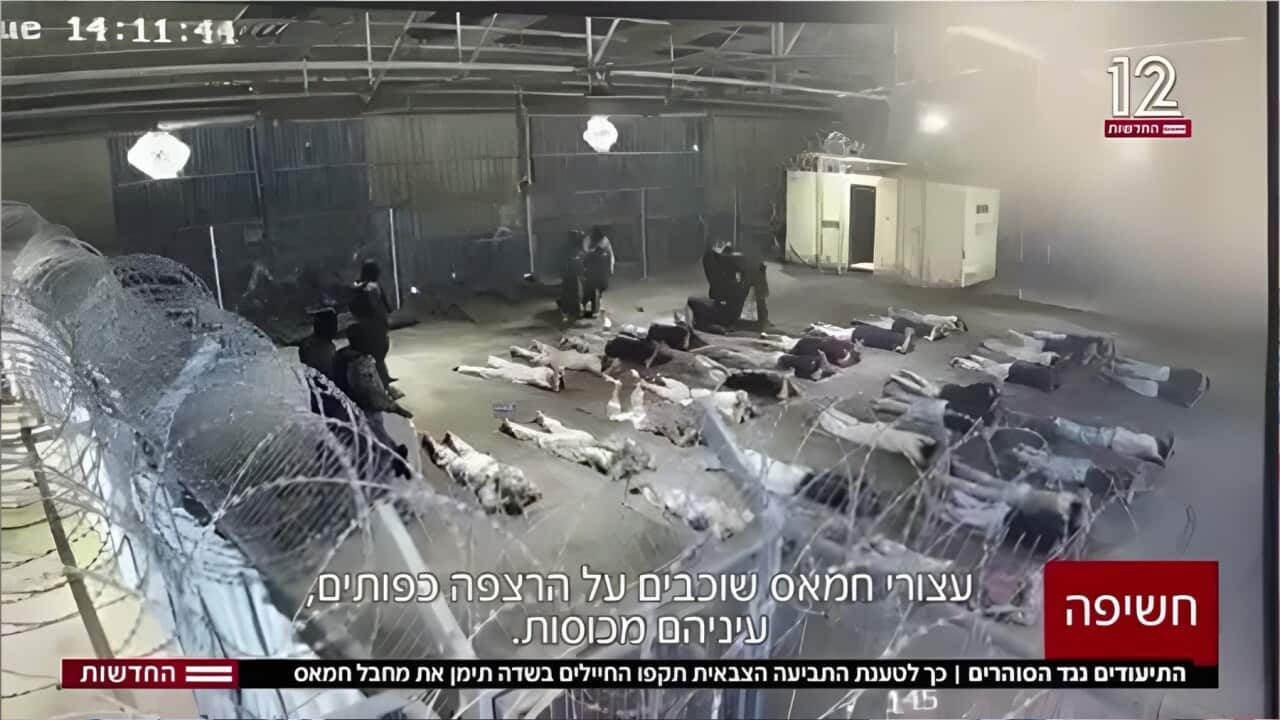TRANSCRIPT
The Israeli Supreme Court has considered a petition to close a desert military prison where soldiers have been accused of abusing Palestinians, as a new video emerged alleging to show the sexual assault of a Palestinian detainee.
A new report from Israeli Human Rights group B'Tselem has found Palestinian prisoners inside Israeli prisons are being systematically tortured and abused.
The United States has responded, with White House Press Secretary Karine Jean-Pierre saying the reports are deeply concerning.
“The reports of rape, torture and abuse are deeply, deeply concerning. And we have been clear and consistent with Israel that it must treat all detainees humanely and with dignity, in accordance with international law, must respect detainees' human rights, and must ensure accountability for any abuses or violations. We reiterate that we support an IDF investigation into allegations of serious abuse of Palestinian detainees by IDF soldiers. It is essential that the rule of law and due process prevail. That is what we're going to see and obviously we're going to continue to have those conversations.”
In leaked surveillance camera footage, aired on Israel's Channel 12, Israeli reservist soldiers are seen picking a detainee out of a large group of blindfolded men.
The video is believed to have come from the Sde Teiman detention facility.
The detainee is then taken to a corner, after several hours he was taken to hospital with medical reports describing his condition as "complex", adding that his bleeding was caused by the insertion of an object.
Human rights group B'Tselem says severe acts of violence and sexual assault are frequent in the prisons.
The group collected 55 testimonies from Palestinians held in Israeli prisons, most of whom they say were being held without charges.
Among them was 21 year-old Maryam Salhab, a pharmaceutics student from the Hebron District.
"We were brought to a dirt field, one of the soldiers kicked me and I fell to my face. I tried to lift my head to breathe, but they pushed my head down with their legs. One after the other soldiers kicked and hit me in the stomach and back. One time, two soldiers stood on my back for three minutes. In those three minutes I said to myself, 'That's it, this is my end."
Human Rights groups have been engaged in a legal battle since June to shut down the Sde Teiman detention facility, where Israel has held many Palestinians detained in Gaza since October.
The groups claim that conditions at the facility are grave and that abuse by Israeli soldiers is common, basing their claims on testimony from released detainees and Israeli whistle-blowers.
The B'Tselem report is titled "Welcome to Hell", which some detainees say was how they were greeted by Israeli soldiers upon their arrival at the prisons.
Other testimonies detail brutal beatings and frequent torture.
53-year old father of five Ashraf al-Mutasef says soldiers would often blast loud music throughout the night to prevent prisoners from sleeping.
"One morning at 6am they raided our cell, about fifteen guards with a monstrous dog. Sometimes they made him attack sensitive body parts. They attacked us all, kicking us and hitting us with sticks. I was leaning against a wall behind others in the cell. They started kicking me in the neck and ear. Unfortunately, I got a very hard blow to my ear. I've completely lost hearing on that side.”
B'Tselem says the testimonies reveal the outcomes of a rushed transformation of more than a dozen Israeli prison facilities, military and civilian, into a network of camps dedicated to the abuse of inmates as a matter of policy.
The Israeli military says it categorically rejects allegations of systematic abuse, including sexual abuse, in its detention facilities.
Meanwhile, Egypt and Britain have asked their airlines to avoid Lebanese and Iranian airspace amid growing concerns of broader regional conflict.
An attack is expected in the coming days, following vows of revenge from Iran and Hezbollah for the assassinations last week of Hamas leader Ismail Haniyeh and Hezbollah military commander Fuad Shukr.
An emergency meeting of the Organisation of Islamic Cooperation was held at Iran's request to discuss the killing of Hamas leader Ismail Haniyeh and Iran's response.
Gambia's Foreign Minister Mamadou Tangara has told the meeting the assassination marks a significant escalation in the conflict.
“This unlawful act not only undermines the prospects for a peaceful resolution, but also exacerbates the tensions within this region. The aggression and violation of the sovereignty and territorial integrity of the Islamic Republic of Iran by the assassination of a political leader on its soil, is an act that cannot be viewed in isolation.”
US State Department spokesman Matthew Miller says the US hopes the OIC meeting also pushes for de-escalation.
“We would hope that at that OIC meeting the same thing happens (calls for de-escalation), that we have been, that we have been trying to effectuate throughout the last week, which is that all parties that have a relationship with Iran impress upon Iran, the same way that we've been impressing upon the government of Israel, that they shouldn't take any steps to escalate the conflict.”













